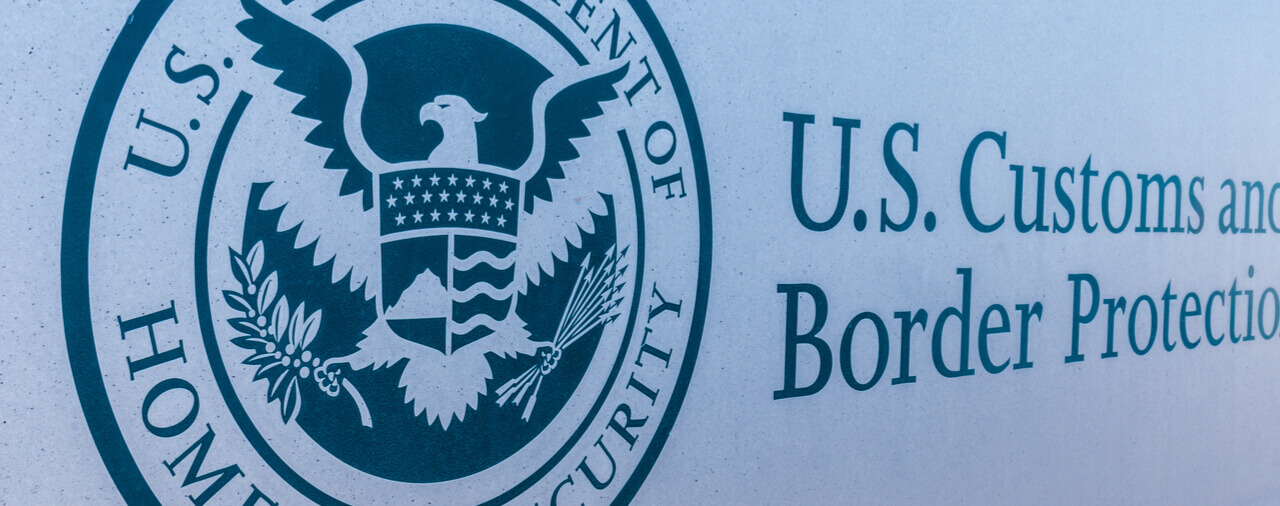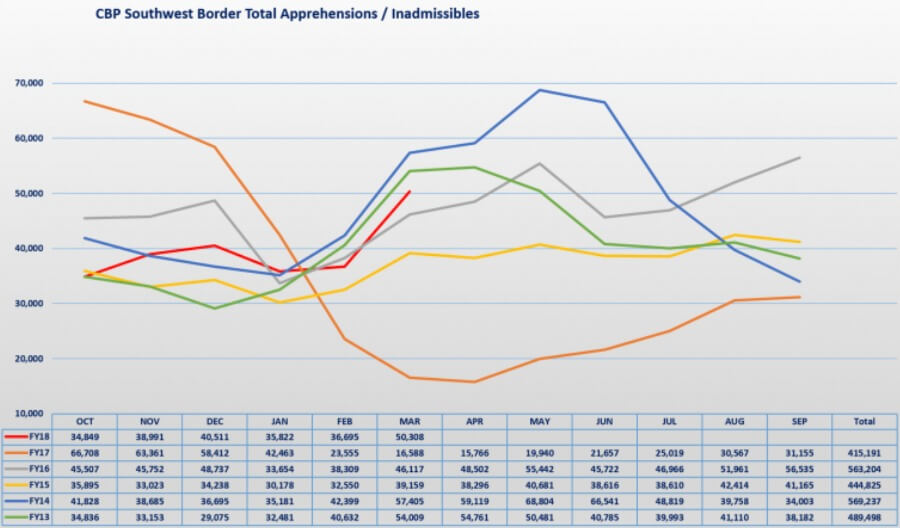The U.S. Customs and Border Protection (CBP) reported a sharp rise in March of 2018 in both the number of individuals apprehended along the Southwest border and the number of individuals determined by the U.S. Customs and Border Protection (CBP) to be inadmissible at the Southwest border [PDF version]. The numbers in both categories were higher than in previous months of the current fiscal year and the combined numbers were more than triple the number of apprehensions/inadmissibles in March 2017. We will review the relevant statistics in this post. To learn about the record low numbers of apprehensions in fiscal year 2017, please see our full post on the subject [see blog].
Notable Statistics
In March 2018, the CBP apprehended 37,393 aliens at the Southwest border. Of these, 4,171 were unaccompanied alien children and 8,882 were family units. All three of these numbers were substantially higher than any other month in fiscal year 2018 thus far. Please see the below chart for details:

The increase is especially dramatic compared to March 2017, which saw record-low numbers in all three categories [see blog]. In March 2017, only 12,193 individuals were apprehended between ports of entry along the Southwest border, less than one-third the number in March 2018. The number of unaccompanied alien children apprehended was only 1,043, about one-quarter the number in March 2018. Furthermore, only 1,125 apprehensions were part of family units in March 2018, which was less than one-eighth the number one year later. Thus, we glean two noteworthy points through comparing the number of apprehensions in March 2018 to March 2017. First, the overall number of apprehensions was about three times greater in March 2018. Second, the proportion of apprehensions that were unaccompanied alien children and family units was far greater in March 2018 than in March 2017.
March 2018 also saw similar trends regarding aliens who were found to be inadmissible at ports of entry by the CBP. In total, there were 12,915 such aliens, with 1,099 being unaccompanied alien children and 5,127 being parts of family units. All three numbers, again, represent highs for fiscal year 2018 thus far:

The number of aliens found to be inadmissible was dramatically higher in March 2018 than in March 2017, although the increase was proportionally less than the number of apprehensions, albeit only slightly so. In March 2017 [see blog], only 4,407 aliens were found to be inadmissible along the Southwest border by the CBP. A mere 122 were unaccompanied alien children and 764 were parts of family units. Again, we see that, while the overall number of inadmissibles increased sharply in March 2018 from March 2017, the increase was even more pronounced in the number of inadmissibles who were unaccompanied alien children and the inadmissibles who were part of family units.
The total number of apprehensions/inadmissibles in March 2018 is, while high based on recent trends, not unprecedented. The CBP data shows that the number is lower than it was for the same month in fiscal years 2013 and 2014, and substantially lower than the first three months of fiscal year 2017 prior to President Donald Trump taking office.
[Click image to view full size]
However, the number of apprehensions/inadmissibles in March 2018 is higher than it was in fiscal years 2015 and 2016 and, as we explained, three times greater than it was in fiscal year 2017.
Analysis
In our article on the same categories of statistics for March 2017, we stated that it was unclear whether the “low numbers indicate a long-term trend or a short-term blip.” The early returns in fiscal year 2018 suggest that the number of apprehensions/inadmissibles are returning to the levels that were seen prior to President Trump taking office. Whether this is primarily attributable to conditions in Central America, changing perceptions of President Trump and immigration enforcement, or other factors remains unclear. However, it is worth noting that the Trump Administration has begun pursuing aggressive immigration enforcement policies in response to the recent increase in border crossings. Please see our post on recent remarks delivered by Attorney General Jeff Sessions on the subject to learn more about the response and find links to our articles on the subject [see blog].
Any alien who is charged with offenses relating to illegal entry or found to be inadmissible at the border should consult with an experienced immigration attorney immediately for a case-specific consultation. This is especially important in cases where the alien is seeking a form of immigration protection such as asylum, withholding of removal, or relief under the Convention Against Torture.






